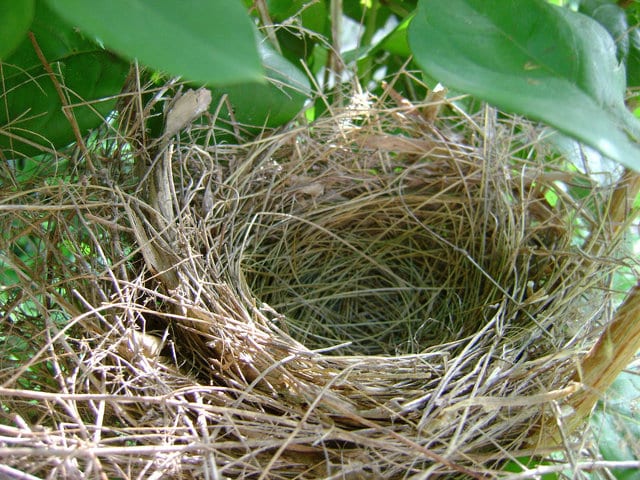Several years ago a robin decided to build a nest in a planter on our deck.
The semi-circular wrought iron planter, permanently attached to our patio, right off our sliding glass doors, was apparently the perfect place for Mama Robin to lay her three eggs.
We learned a lot about robins that year as we watched Mother Nature right outside of our door.
My kids, who were school aged at the time, used the internet to learn about robins and we watched with excitement the day the babies broke out of their eggs to greet the world.
I still smile when I think about how two of those nestlings eagerly left the nest when Mama’s gentle nudging said it was time. The third little bird hung on for dear life and almost refused to go. Eventually, the whole family went on their way and we were left with the empty nest.
The empty nest isn’t all it’s cracked up to be.
With the departure of my older two and the “he’s never here” status of their younger brother, the size and silence of our empty nest has become almost deafening.
When we moved into our house with one, 8-month-old baby, it seemed like all we would ever need. Two more kids, an assortment of dogs, friends, stuff, etc. filled our house to the brim over the years. We finished the bonus room over the garage for more space. We finished our basement for overflow and for a place for the kids to hang out.
Today, there are rooms in my house that I only go into to wipe away the dust and the cobwebs.
I miss my little robins.
As our house went from five to four to three, back to four, down to three again, and now (most of the time) two, the energy of our house has diminished significantly. Everything from grocery shopping to how much we spend filling up the gas tanks have almost gone back to pre-arrival of babies levels.
I’m still trying to figure out how I feel about it.
According to the experts, Empty Nest Syndrome is a condition that is observed by parents when their robins leave the nest. It can be characterized by symptoms that parallel depression; sadness, loneliness, feelings of social isolation, and loss.
Women, more often than men, report feeling unsure about their purpose and identity when the day to day needs and demands of parenting are no longer present. Men who experience Empty Nest Syndrome reportedly tend more to having doubts or regrets about how they spent their time or decisions that they made when the kids were home. The parent’s experience of Empty Nest Syndrome can be further impacted by health issues that typically come as those parents age.
On some days, my longing for the laughter and the energy and the enthusiasm that used to ring throughout the walls of this house is palpable.
On other days, a drive in the convertible we bought since they left can be a really fun weekend activity. No kid duties or carpools or piles of laundry waiting to be sorted. That out of the way restaurant and stop for dinner and drinks, will cost us less than we spent on school lunches for a week during the kid years.
On every day, it means that they have launched and are starting their lives independent of Mom and Dad.
According to the research, the ease at which empty nesters make the adjustment to the empty nest is related to how their little robins were transitioned to independence. In other words, parents who hover and who hang on to control or oversight of their children’s decisions too long have a more difficult time when those children eventually leave the home. Understanding that the empty nest is a natural progression and celebrating the independence of our children is better for everyone involved.
I get that they had to leave. It doesn’t mean that I don’t miss them every day.
We are starting to use words like downsizing and retirement with more frequency than we used to. We plan trips to visit where they are. When they make plans to come home for a visit, we countdown the days with excitement. The beauty of the internet and the immediacy of smart phones make staying connected very easy.
The baby robins on our back deck left the nest after being nurtured and cared for by Mom and Dad. When it was time for them to go, they were gently nudged out of the nest to begin their lives on their own.
And then the nest was empty.



